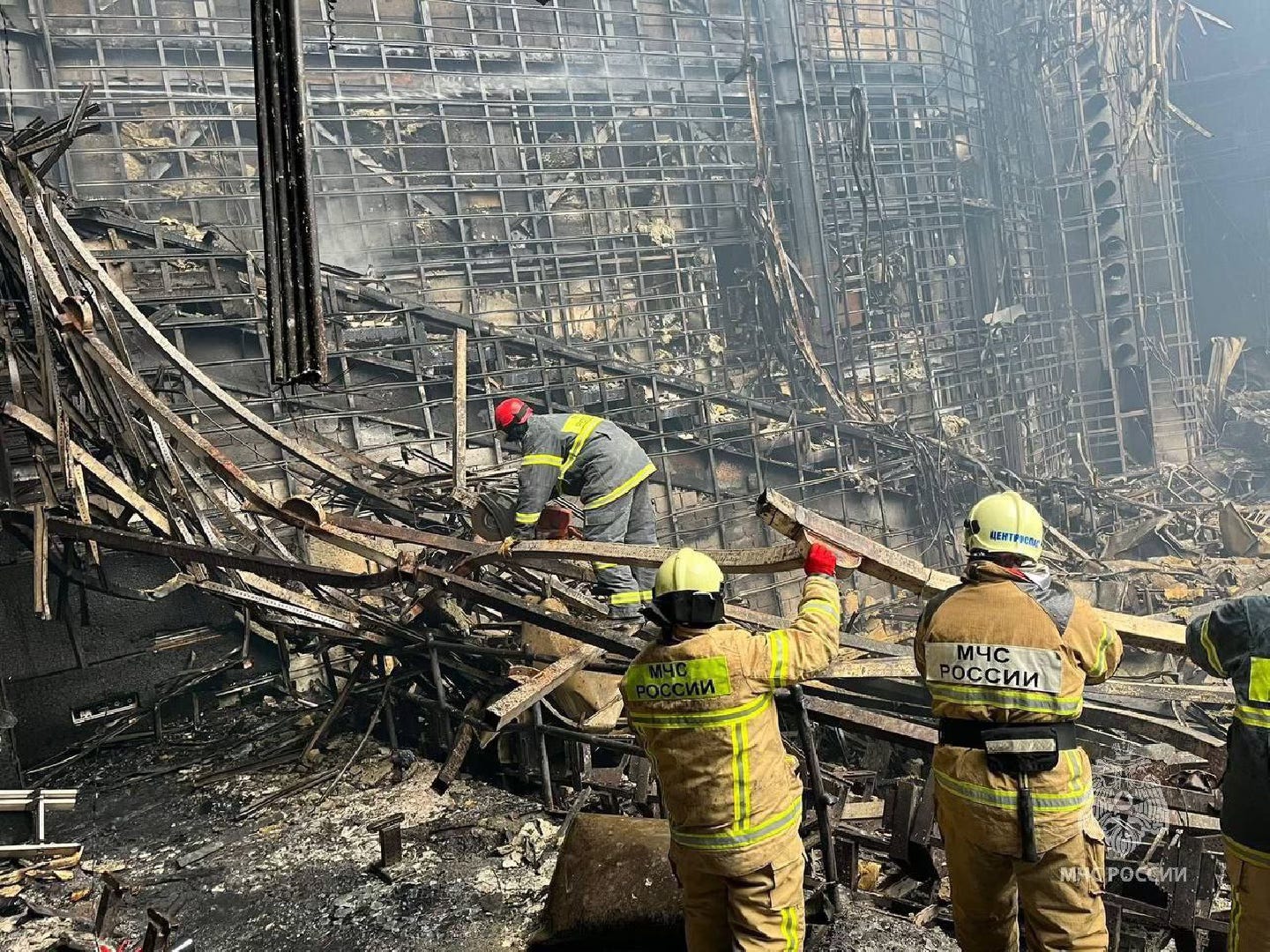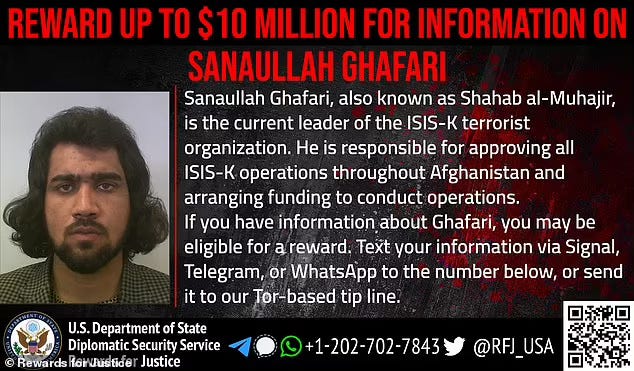Another 9/11-Style Attack in the Works?
Shadowy ISIS-K leader Ghafari has mass-casualty track record, big ambitions in the West
SOMEWHERE IN THE REMOTE MOUNTAINS of Pakistan’s southwest province of Balochistan, a shadowy, 29-year-old veteran of the Afghan Army is believed to be holed up, keenly conscious that the U.S. government has placed a $10 million bounty on his head.
 |
The man’s name is Sanaullahal Ghafari and little is known about his background or precise whereabouts. He gives no interviews, nor does he post jihadi sermons on social media. But according to a leading researcher, Ghafari, whose nome de guerre is Shahab al-Muhajir, may now be the most dangerous terrorist in the world— the undisputed leader of a group, the Islamic State of Khorasan, or ISIS-K, that is aggressively plotting mass casualty events around the world and substantially contributing to a threat environment that is spooking counter-intelligence officials in ways that are eerily reminiscent of the weeks or months before Sept. 11, 2001. ...
“As you can see, the lights are blinking red, right?” said Colin Clarke, director of research for the Soufan Center, who has written extensively about the threat posed by Ghaffari and ISIS-K, in an interview with the SpyTalk podcast.
“And so it almost feels like we’re sleepwalking into this moment—where something big could happen and it could be traced back to that exact place where the 9/11 plot was hatched”—Afghanistan.
While the current U.S. threat matrix is a complicated and challenging one—encompassing everything from Iranian assassination plots to right wing militia actions— none loom larger than Ghaffari’s ISIS-K. This year alone, the group has pulled off spectacular attacks that killed over 100 people in Tehran and over 130 at a music hall concert in Moscow. Moreover, there are mounting signs that ISIS-K is planning much more in the West—most recently, recruiting teenagers to strike a Taylor Swift concert in Austria, and, according to the FBI, infiltrating eight operatives from Tajikistan into the United States through the southwest border.
“ISIS-K, in terms of operational tempo, the frequency of their plots and attacks have increased drastically, at least in terms of the West,” said Clarke. “So this is a group that was largely and still is based in Afghanistan and parts of Pakistan, but they've reached out to various diaspora communities—central Asian, chief among them, especially the Tajik diaspora in the West, but also diasporas from the Caucasus and the Balkans to tap into some of the radicalized individuals that live in places like Austria, in places like Russia, in places like the United States and Canada.”
“And so they're trying to conduct a large scale, what we would call a spectacular attack or a high profile attack against a soft target. The Taylor Swift concert being the kind of most recent and high profile, but they're big game hunting, so to speak.”
And yet, Ghafari, the man in charge of the big game hunt, stands in stark contrast to the more celebrated, charismatic terror leaders that preceded him, such as Al Qaeda chief Osama bin Laden or Abu Bakr al-Baghdadi, the original “caliph” of the Islamic State who blew up himself and two of his children during a U.S. counter-terrorism raid in Syria in October, 2019. Instead, says Clarke, Ghafari “is known to be a strategist.”
“He's not the type of figure that Baghdadi was—or he's far from an Anwar al-Awlaki [the former chief of the Al Qaeda affiliate in Yemen] right, where he's out there kind of putting out these YouTube videos antagonizing the West. He seems very much about business.”
That business has been focused on dramatically expanding the reach of ISIS-K, using sophisticated social media messaging—in more than a dozen languages—to recruit young jihadis in Western Europe, Africa and even the United States. What Ghafari has done is “sought to internationalize the group. And this has led to a push for ISIS propaganda to be produced in multiple languages, right? In multiple formats. Really, he's kind of flooding the zone with propaganda. And especially when it comes to these external attacks, hoping that radicalized individuals, homegrown violent extremists in the West, that this propaganda is gonna resonate with them and that they're gonna then go be inspired to conduct attacks.”
Thin Jacket
What may be most remarkable, however, is that in light of Ghafari’s prominence on the world terror stage, how little is publicly known about him. When he was named the leader of ISIS-K in 2020, Ghafari was widely reported to have been an Arab from the Middle East—an origin story that no doubt emerged because he was believed to have fought for ISIS under Baghdadi’s command in Iraq and Syria. But more recently, U.S. officials have insisted he was an Afghan—the State Department has even posted his Afghan passport number—and more recent reports have cited the Taliban as saying he served in the Afghan Army before joining ISIS in 2014.
In its “Reward for Justice” posting on the $10 million bounty for information on Ghafari’s whereabouts, the State Department described him at the time he was named the group’s leader as “one of ISIS-K’s ‘urban lions’ who has been involved in guerrilla operations and the planning of suicide and complex attacks.”
But while his exact location may be a mystery, what is clear, according to Clarke, is that Ghafri has American blood on his hands—most directly in the ISIS-K attack on the Kabul airport. But unlike 20 years ago, when the administrations of George W. Bush and Barack Obama launched waves of drone attacks in efforts to assassinate foreign terrorist leaders, those efforts have been drastically cut back, first under President Trump and even more so under President Biden.
“You know, after the Abbey Gate attack [during the chaotic Kabul withdrawal], President Biden attempted to reassure the American people by saying, you know, even though we won't have a presence in Afghanistan with, quote unquote, ‘boots on the ground,’ what we do have is an over the horizon capability,” Clarke said. “Some call it offshore counterterrorism.”
That strategy seemed to notch one big success last year when, in the most notable drone strike of his presidency, Biden authorized the strike in downtown Kabul last summer that killed Ayman Al-Zawahiri, bin Laden’s longtime number two, who took over Al Qaeda after his death.
But, says Clarke, “my pushback would be we keep seeing an uptick in ISIS-K plotting in the West. There are now Tajiks coming across the southern border. What we're doing isn't really effective in attenuating this group and mitigating the group's ability to plot, plan and conduct terrorist attacks. So what is the United States doing?”

His comments point to what could be potentially the most politically explosive fallout from ISIS-K’s aggression: the prospect that terror operatives from the group illegally cross the southwest border and mount a mass casualty event into the United States before the November election.
“Look, I never want to be somebody that says the sky has fallen, or to be some kind of hype man that works in hyperbole, because I don't think it's useful,” Clarke said on the podcast. “That said, myself, my colleagues are incredibly worried because we see these attempts happening in Europe. We see these kind of attempts at penetration of the U.S. border. But when you kind of live in this every day and you track these things, it does feel like we are approaching the precipice of another 9/11.
“For people that kind of look at this stuff every day, the data points just keep adding up. And I do have a very uneasy feeling that they're going to try to pull off something big in the United States, in Canada.”
And if they do, prior to the election, “it would be devastating for the Harris-Walz ticket,” Clarke added. “This would give red meat to Trump to basically say, ‘Look, everything I've said about the border, you failed,’ right?”
While the issue is hardly that simple, he adds, the bottom line is: “This is a terrorist group that's continuing to target Westerners and we have to be vigilant. We have to do everything we can to prevent that.”



No comments:
Post a Comment